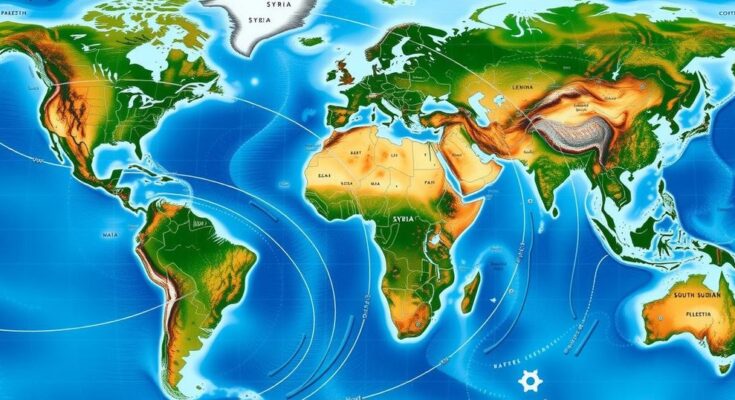The article addresses urgent humanitarian crises in several regions: Gaza’s call for a ceasefire amid renewed violence; ongoing aid efforts in Syria; severe clashes causing displacement in the Democratic Republic of the Congo; escalating violence in South Sudan leading to humanitarian access issues; and the aftermath of Tropical Storm Jude affecting thousands in Southern Africa.
In the Occupied Palestinian Territory, Under-Secretary-General for Humanitarian Affairs Tom Fletcher has urged the Security Council to renew the ceasefire in Gaza as violence escalates. Despite prior gains during the ceasefire, the recent resumption of airstrikes has rekindled fears among the Gaza populace, resulting in numerous casualties, including many children. Muhannad Hadi, Humanitarian Coordinator for the region, emphasizes the urgent need for hostilities to be halted and essential services restored to alleviate the dire humanitarian situation.
Fletcher noted that recent airstrikes have led to a grim resurgence in distressing conditions, highlighting that humanitarian aid and essential goods must be allowed into Gaza to prevent disaster. He recounted the successful aid delivery achievements during the previous ceasefire, illustrating that with appropriate access, effective responses are feasible. He firmly stated, “Civilians must be protected. Their essential needs must be met. International law must be respected.”
In Syria, OCHA reports ongoing humanitarian efforts amidst continued violence. The UN and its partners have been able to restore water supplies, provide food, and support vulnerable populations. Recently, UNICEF distributed essential supplies to Lattakia after violence disrupted water services, and humanitarian operations persist throughout affected areas. At the Brussels IX Conference, Emergency Relief Coordinator Tom Fletcher highlighted the urgent need for action, warning, “The price of failure will be much greater for all of us than the cost of success.”
The situation in the Democratic Republic of the Congo remains critical due to ongoing clashes, particularly in the eastern provinces. Reports indicate that the fighting has resulted in casualties and significant displacement, with over 100,000 individuals fleeing to neighboring provinces. Humanitarian agencies face severe operational challenges in meeting the urgent needs of these displaced populations.
In South Sudan, escalating violence in Upper Nile State has led to the displacement of approximately 50,000 people, with humanitarian operations severely affected. The Humanitarian Coordinator emphasized the importance of protecting civilians and facilitating access for aid workers to deliver essential assistance. Current funding levels lag substantially behind the needs, posing risks for vulnerable communities.
Lastly, the aftermath of Tropical Storm Jude has impacted nearly 420,000 people across Madagascar, Malawi, and Mozambique, causing significant displacement and infrastructure damage. In Madagascar alone, over 300 classrooms were destroyed, affecting more than 80,000 students. As the humanitarian response continues, there are concerns about potential spikes in cholera cases in the wake of this disaster, demonstrating the need for continuous support in the region.
The situations in the Occupied Palestinian Territory, Syria, the Democratic Republic of the Congo, South Sudan, and areas affected by Tropical Storm Jude highlight a pressing need for humanitarian aid and international solidarity. Each region faces significant challenges due to ongoing conflict, natural disasters, and inadequate funding. Coordinated efforts are essential to protect civilians, deliver aid, and restore basic services, ensuring that humanitarian crises are addressed promptly and effectively.
Original Source: www.unocha.org




